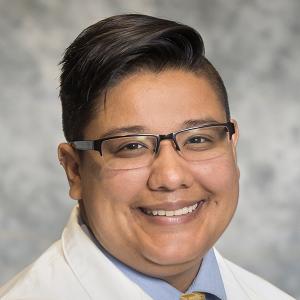
Ry, Ry’s, Ry’s self
What are your career goals?
My career goals are to learn to provide comprehensive care across the age spectrum and to partner with my patients to navigate through life's various challenges and opportunities. I want to be a provider that not only focuses on improving the health of my patients, but also the health of the broader communities they are a part of. I hope to incorporate my public health degree in investigating the different systems within society that structure opportunities with the goal of promotion of equitable health. As a future career goal, I want to learn how we can bring primary care out of traditional clinic spaces in order to better partner with community organizations and increase access to care for underserved communities.
What attracted you to the Duke Family Medicine Residency Program?
I loved the family atmosphere within the program and how the residents and faculty were all approachable, compassionate, passionate and curious. It really helped me feel that I would be joining a community that was supportive and where people would be invested in my goals and growth. I really liked that the Duke Family Medicine program not only talked about the importance of community engagement, but actually built in the time, flexibility, and opportunities to partner with community members in the creation of projects to address a community need. It was very clear that Duke Family Medicine valued and collaborated with the community outside of the academic training spaces.
In your opinion, what makes Duke Family Medicine special?
One of the pieces that I believe makes Duke Family Medicine truly stand out is the population health curriculum. I found their focus not just on improving the health of their patients but also of the broader communities in line with my goals. Additionally, I think the questions and the type of work that Duke Family Medicine residents and faculty are pursuing makes it clear that there is something really special about this program. I found the questions they were trying to answer compelling: How do we improve health for the members of our community who don't show up to our clinics? How do we highlight the stories of patients in order to educate health care providers on the challenges and also strengths that exist within our communities? How do we examine the effects of shame on learning and design environments that foster real engagement and positive teaching approaches?
What strengths or skills do you have that could be of benefit to the community?
I am very comfortable sitting in discomfort, which means I am good at creating space for others to share the sometimes difficult or painful experiences they encounter. I have spent a lot of time learning to find resources and help people navigate a complex medical system to meet their health needs. I am a trained facilitator and am good at creating spaces for dialogue and engagement around issues.
What are you passionate about?
I am passionate about health equity and thinking of innovative ways to change structures and policies that disadvantage communities with less social capital. I am particularly passionate about addressing the role that racism plays in our health care system and which prevents us from reaching our goals of health equity and access to quality care.
What are your hobbies outside of work?
I am an avid reader and love to read epic fantasy and graphic novels. I like traveling with my wife (without a lot of plans!) and talking with new people. I enjoy laying: in hammocks, in grass, on the beach and listening to music.
What is something interesting that not many people know about you?
I really really enjoy making sound effects to narrate my thoughts and communicate, although my cat and wife are generally the only ones who get to hear the full spectrum of sounds I've learned to make.
So far, what has surprised you most about Duke?
The sheer size of it. Having spent the last decade in the smallest state in the country at small institutions, it has been a surprise to see how big the Duke network is.
Education and Training
Loyola University Chicago Stritch School of Medicine, MD
Johns Hopkins University, Masters in Applied Science (MAS) in Population Health Management
University of Florida, BS in Psychology and Microbiology